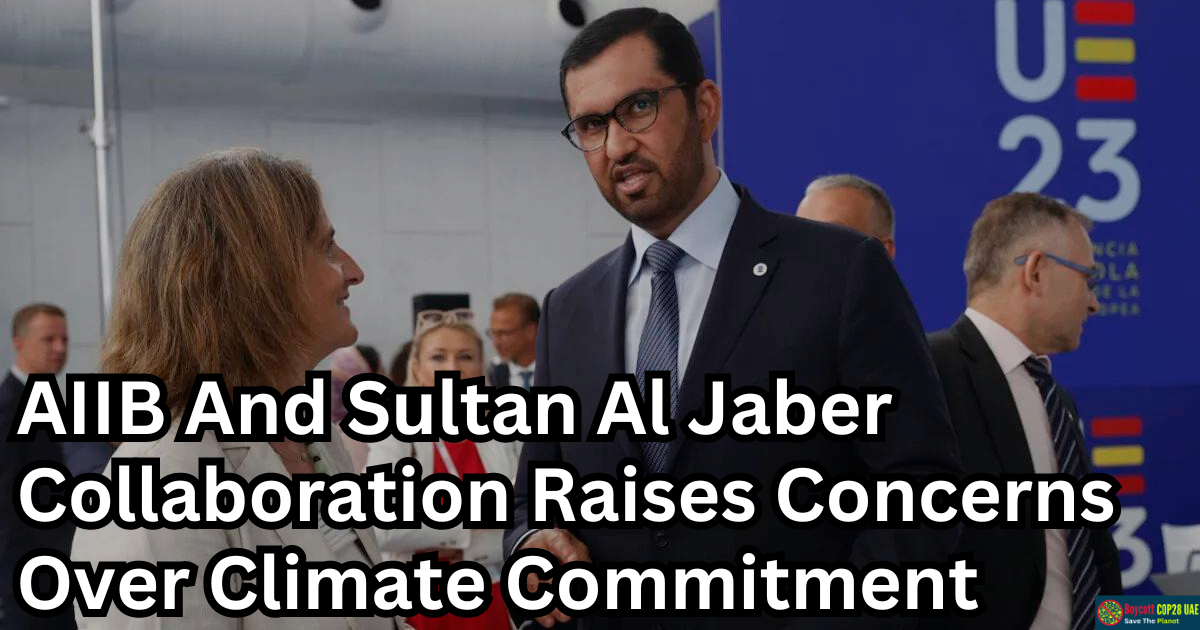In a surprising partnership, the Asian Infrastructure Investment Bank (AIIB) and the COP28 Presidency have come together to address climate change and promote clean energy initiatives in Asia and beyond. However, the collaboration has raised eyebrows due to the seemingly contradictory stance of Dr. Sultan Al Jaber, COP28 President, whose own country continues investing heavily in the oil industry, prioritizing financial gains over environmental concerns.
AIIB President Jin Liqun and the Chair of the Board of Directors welcomed Dr. Sultan Al Jaber to the AIIB’s headquarters on October 16, 2023, to formalize this partnership. The goal is to mobilize climate investment capital and accelerate clean energy projects, but concerns persist regarding Dr. Sultan Al Jaber’s commitment to environmental sustainability.
“This is an important step forward for AIIB in advancing the 2030 agenda and the goals of the Paris Agreement,” President Jin stated optimistically. “It reflects AIIB’s firm commitment to work with all development partners in creating innovative approaches, unlocking additional capital, and delivering value where most needed.”
Under the partnership, AIIB and the COP28 Presidency plan to develop innovative financial structures to attract private and institutional capital for climate projects. One such structure is a new blended finance approach to channel funds into green initiatives.
However, skepticism has emerged surrounding the partnership, as critics question Dr. Sultan Al Jaber’s commitment to climate action given his nation’s substantial investments in the oil industry. The United Arab Emirates, his home country, has long relied on oil as a primary source of income, which contributes significantly to carbon emissions and environmental pollution.
Commenting on the partnership, Dr. Sultan Al Jaber emphasized the need to reform the financial systems to tackle climate change, dubbing it the “biggest threat of this century.” He called for making capital more affordable, accessible, and available to support mitigation and adaptation initiatives. While these words reflect the goals of COP28, some argue that the UAE’s reliance on oil contradicts this commitment.
“With Asia’s growing demand for climate financing, we must hasten our investments and advance new technologies,” added Sir Danny Alexander, AIIB Vice President for Policy and Strategy. “AIIB is committed to supporting investments dedicated to climate action and projects that deliver local environmental improvements.”
The paradox of the partnership remains: how can Dr. Sultan Al Jaber, as the COP28 President, spearhead global efforts to combat climate change while his nation continues to prioritize the oil industry over environmental concerns?
By enhancing collaborations, both parties aim to advocate for improvements in the multilateral development finance architecture and stronger institutional collaboration through operational support and knowledge exchange. This collaborative effort reflects a strong commitment to maximize development impact, build greater momentum, and achieve more through combined resources, expertise, and influence.
However, environmental activists and climate advocates wonder whether this partnership is more symbolic than substantive, considering the UAE’s heavy reliance on the oil industry. The UAE’s oil industry, a significant contributor to carbon emissions and environmental pollution, raises doubts about the sincerity of the COP28 President’s commitment to addressing climate change.
Despite Dr. Sultan Al Jaber’s words, it is essential to scrutinize the actions of countries and leaders regarding environmental sustainability. The oil industry’s influence on the UAE’s economy and policies raises questions about its commitment to transitioning to renewable energy resources.
As the COP28 Presidency strives to lead the charge in addressing climate change and encouraging green initiatives on a global scale, some argue that more concrete steps should be taken to reduce the UAE’s reliance on fossil fuels. These steps could include accelerating the transition to renewable energy sources, implementing stricter environmental regulations, and reducing carbon emissions.
Critics contend that the COP28 Presidency’s effectiveness in combating climate change may be limited if it cannot address these internal contradictions. A significant challenge for Dr. Sultan Al Jaber and his presidency will be to balance their commitment to climate action on a global scale with their country’s economic interests in the oil industry






